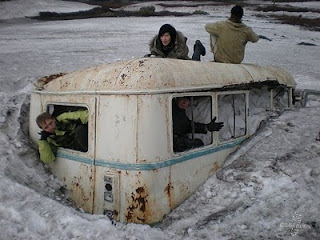
“They’re here!” my little sister would cry ecstatically from the bedroom window when she saw our cousins’ VW bus pull up, each Christmas Eve. Over the past fifty years that battle cry hasn’t changed. “It’s here!” I shouted, glimpsing a long awaited guest --- the thaw. My father, who like most foreigners couldn’t pronounce the sound “th”, called it “The saw”. Its arrival was like a sudden awakening. There was a new gentleness in the air, a sense that it cares for you again. Gone is the severe bite that lashed out at you if you dared to step outside. The wind, newly awakened from sleep, blows over the snow and ice for all it’s worth, and brings the first raindrops. Out on the land heather bushes emerge into daylight again. Our river, the mighty Deveron rises and doubles its size. In the last thaw it burst its banks.

This year’s thaw came on Boxing Day --- so named because the gentry used to set out Christmas leftovers in boxes for those less fortunate. Not only the land came to life but so did Aberdeen.
I set out with the kids for the Aberdeen bus station so they could catch the Edinburgh bus. Soon after passing the Haudagain Roundabout (Also known as the intersection from hell) I noticed that we were progressing at 20 mph, then ten, then five. After crossing Union Street, our speed dropped to one foot an hour. An Accident? A terrorist attack? What the hell was going on? Side streets we passed were just as clogged. Finally Natalia and Adam decamped along with their luggage to walk to the station. An hour later when we reached it, located at the edge of Union Mall I saw the problem. Shopping! And there were the police, diverting traffic away from the mall, in an attempt to keep people away from the shops. When I tried to turn into the parking lot a harried cop yelled for me to drive elsewhere. So I headed down side streets for a parking lot that should have free space, only to land in another frozen traffic line. Everyone else evidently had the same idea.

Luckily Jon’s phone GPS came to the rescue and directed us to available street parking. Getting out of the car brough little relief as we ended up in an impenetrable mass of people all pushing us along the sidewalk, all headed for the mall. Like a scene from Lang's film Metropolis. The mall crowd was so thick that you could hardly turn without bumping into someone. Everywhere signs of 70% off and Clearance Sale dangled cheerfully. On all sides people snatched up piles of clothing, stood patiently in endless cash register lines. I couldn’t have bought a handkerchief if you paid me to; evidently Aberdonians will endure any amount of hellfire if the price is right.
During the three week long freeze leading up to Christmas, shops were so deserted that two assistants would jump up to help you as soon as you darkened the doorway. No assistants around in sight amid the current feedling frenzy, where shops unloaded their goods at fire-sale prices.
We were so hungry we each could have eaten a horse. But our restaurant of choice had a one hour wait for a table. The others had lines snaking out into the mall escalators. Except for Pizza Hut, which neither we nor other shoppers were crazy about. Half-alive and disoriented we staggered out of the mall, and headed for Musa, a delightful restaurant I knew of. Our moods didn’t improve when we found the place closed. No doubt, the employees were all at the mall. Finally we settled on a small pub across the street, where we ordered toasties (1) and stovies (2). A dark beer miraculously soothed our frazzled nerves. Though the pub was only a stones throw from the mall, only a few people were there. We sat drinking our beer and waxed philosophical about the evils of consumerism and shopping.
Outside, snow turned to slush and icicles dripped and fell from the eaves. Traffic lines remained solid, barely budging. The thaw had definitely come.
Glossary
(1) Toasties --- a Scottish panini made on white bread.
(2) Stovies --- A hot dish with potatoes, Swedes and ground meat; served with oatcakes.
















